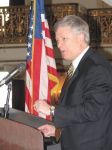If small businesses are the harbinger of economic recovery, then western Pennsylvania shows clear signs of hope. That was the message African American Chamber of Commerce President and CEO Doris Carson Williams had for those attending the chamber’s May 19 annual meeting and luncheon.
 |
| BIG BUSINESS —Pitt Chancellor Mark Nordenberg warns that attempts to tax large nonprofits like Pitt could cripple the only growing business sector in the region.
|
“For the chamber, the good news is that we grew our membership by 7 percent,” she told the 500 guests in the Omni William Penn ballroom. “The bad news is we lost 4 percent, and they were in the small capacity business category. But our new members are larger firms, and several existing members have increased their capacity and membership levels.”
After thanking incoming and outgoing board members, and event sponsor PNC, Williams introduced University of Pittsburgh Chancellor Mark Nordenberg. Nordenberg, who joined Pitt’s law faculty 33 years ago and became chancellor in 1996, noted the university’s growth as a research and educational institution has provided numerous opportunities for small businesses, local employment opportunities and revenues for Pittsburgh and Allegheny County.
“We are in the top 10 in receiving federal science research funds, and in the top five in funding from the National Institutes of Health,” he said. “We received $650 million in grants last year and will go over $700 million this year.
That, in turn, supports 23,000 local jobs from research activities.”
Between 2008 and 2009, when every other sector of the regional economy was losing employees—7,400 in manufacturing, 5,300 in hospitality, 2,600 in business services, for example, the education/medical sector added 5,400 jobs.
As a result, Nordenberg said politicians at various levels of government have sought to tax the nonprofit university to compensate for lax fiscal stewardship. He singled out state Sen. Jay Costa, D-Forest Hills, for helping the university defeat those efforts.
“Last summer, Gov. Rendell tried to declare that Pitt, Penn State University and Temple University weren’t public institutions in order to take stimulus funds,” he said. “Then there was the battle over the city’s proposed ‘tuition tax’ on students. We live in a society in which politicians are under pressure to find short-term fixes despite their long-term peril.”
With the state facing a huge deficit, and a large unfunded pension legacy in the city, he said, solutions need to be good ones. Using the university’s tax-exempt property holdings to argue for taxation is not one of them.
He noted that the university built the Peterson Event Center where Pitt Stadium used to be—not on new property, and that it and UPMC began building on the abandoned steel mill site on the South Side before anyone. And that the Hillman Cancer Center, the Katz Business School and the Peterson Center all generate tax revenue from properties that did not before.
“The city and county have more tax exempt property than 12 years ago; two new stadiums, a convention center,” he said. “Government complains, yet owns the most tax-exempt property.”
Noting that Pitt alumnus and benefactor K. Leroy Irvis essentially saved the university from closing in the 1960s by making it a “state associated” university, Nordenberg said that legacy is in jeopardy.
“Today we see the state retreating from its promise to provide higher education opportunities,” he said. “But we now impart $4 of research support for every $1 dollar in state appropriations. It’s hard to imagine a higher short-term return on investment.”
(Send comments to cmorrow@newpittsburghcourier.com.)